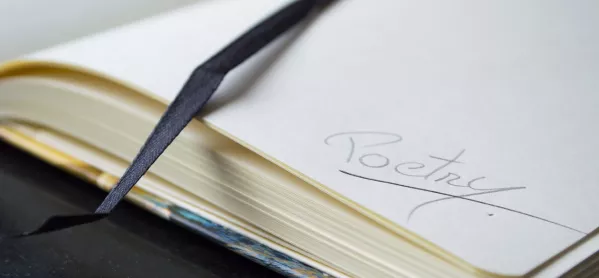- Home
- ‘How writing poetry worked wonders for my wellbeing’
‘How writing poetry worked wonders for my wellbeing’

For teachers, words are our business. Sharing them, spelling them, explaining them, interpreting them, discussing them, sometimes stopping them and most importantly, choosing the right ones to use in a particular context. Words are part of our job and sometimes we can lose sight of the beauty of words and the playfulness of words and that you can have fun with words.
But how many teachers use words as a way of relaxing, as a way of having a break from the hectic nature of teaching and for improving wellbeing?
A few years ago, I thought I would learn how to write poetry and luckily there are plenty of very accessible books out there to help. For example, Stephen Fry’s The Ode Less Travelled is very comprehensive, Michael Rosen’s What is Poetry? is a really encouraging and Glyn Maxwell’s On Poetry is a bit more thoughtful and challenging.
These books encouraged me to start writing and even though I knew I was never going to be a poet, the joy of playing with words is something that all teachers could benefit from. If you decide to write a poem about a particular topic, you are thinking about how you can synthesise information into a palatable format.
If you are writing about a new topic, then quite often you will discover something that widens your learning. For example, recently when I was writing a poem about a possible “Snow Day” I found that Ullr was the Norse god of snow. If you are writing a poem that rhymes, there is nothing better than relaxing in a chair and thinking about the best combination of words to use. In many respects, it is a form of mindfulness because you are just there, in the moment, thinking about words and all the other stuff (like marking, form filling and so on) just empties out of your head.
As a teacher, I write poems that I think will connect with other teachers and this in itself can bring joy. We all have shared experiences, so why not write about them and create amusement for other teachers? Recently, we introduced lanyards at my school and so I wrote a poem about them, put it on Facebook and lots of my fellow teachers liked it.
As an economics teacher, I also write about that and recently I have been trying to summarise the key concepts of famous economists through poetry. It’s been quite hard but very rewarding and these can now be used as a resource in school to help students understand the subject more and I can use them in my podcast.
For the past four years, I’ve been driving English students to Stratford-Upon-Avon for their annual Shakespeare trip and each year, I have written a sonnet to celebrate the event. Again, it is never the best writing in the world but teachers are role models and I think in some way, this encourages the students to write as well.
A few years back, as a leaving present, my Year 13 economists handed me a folder and inside it was a poem from every student in the class, writing about economics or their school life. I was so thrilled and even now, I will have a peek inside, read one of their poems and it will bring a smile to my face.
There is much enjoyment to be had by having fun with words. Don’t just see them as an essential tool for your job. Embrace them, link them, bounce them around in your head, let them roll off your tongue and have a go at producing something and by doing so, you would have given yourself a well-deserved break and had a bit of fun as well.
Here’s one of mine...
NEW LANYARDS
Oh lanyard, oh lanyard, I hate you so.
It’s completely irrational, this I know.
But it has that whiff of corporatism
In a place where education is the specialism.
It feels like a noose around my neck,
I’m like a tethered cow on its final trek.
I’m trying to see why it might be handy
But the photo reminds me, I’m no Dave Gandy.
And the chip makes me feel paranoid
A bit “Big Brother”, my soul destroyed.
And I’m sure I’ll forget it or it will get lost,
Then I’ll feel guilty about the cost.
I know it’s the future but what happens next?
GPS tracking is the least I’d expect.
My one final thought on this monstrosity,
The one I keep thinking about repeatedly,
Is if you’re at a school where they don’t know your name,
Then it’s time to get out of the teaching game.
Gavin Simpson is the head of economics at Dame Alice Owen’s School in Hertfordshire. He tweets at @MrGSimpson
Keep reading for just £1 per month
You've reached your limit of free articles this month. Subscribe for £1 per month for three months and get:
- Unlimited access to all Tes magazine content
- Exclusive subscriber-only stories
- Award-winning email newsletters



